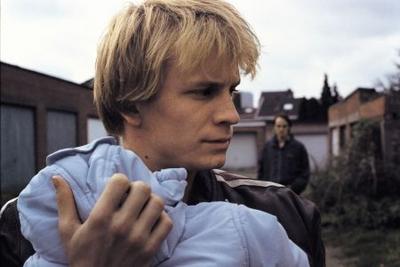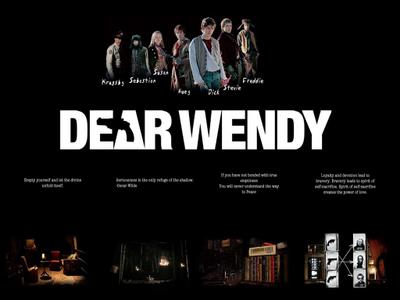

Two films which are must must must sees are the new offerings of Jean-Pierre Dardenne and Luc Dardenne, and Thomas Vinterberg. It was a perfect day of films, surprisingly well matched, approaching the idea of responsibility from completely different directions.
L'Enfant is the story of eighteen-year-old Sonia and her newborn son Jimmy. Bruno is the distant, nihilistic father, a petty criminal with a complete disregard for anyone but himself. Just how selfish is he? This shocking, difficult film plunges us into the depths of his callousness, showing us just how low a person might go.
Focussed and clear, this honest, straightforward film keeps a steady pace, revolving around a number of tense set pieces, each teaching us painfully more about the character. This film is very scarily rooted in reality, with a nouvelle vagueish feel about it. It relies on a slow, steady build towards its very pointed climax, Bruno's rough and abrupt transition from childhood to adulthood. Though the Dardennes paint a fairly bleak portrait of the human condition, the film glimmers with moments of hope. Although I had originally wanted a bigger, more complete change of character, I later realized that I perhaps, actually wanted less. The key scene, really is not the one at the end of the film, and the painful conclusion acts more as a bit of an epilogue. Perhaps I would have pared this back, which is surprising, considering the stark, direct methods the brothers Dardenne employ. My thoughts on the end matter little though: the moment of transition is sincere and revelatory. Full of hard, believable performances, this simple, direct, well constructed film is powerful both in its ability to repel and to redeem.
Dear Wendy is a love story of sorts, or so says director Thomas Vinterberg. The premise of the film is the adoption of a club in the tiny mining town of Estherslope. The catch is that this club is for pacifists who love guns, started by orphan and loner Dick. He accidentally finds himself in the possession of a gun which he feels oddly drawn to, he names it Wendy, and our story has begun; the town's other misfits are soon members, and their strict experiment in empowerment soon gets disasterously out of hand.
First and foremost, this is a fun movie which transitions from reality to fantasy, adding flourishes of humour and showmanship to lend the film a strange, bright tone. As engrossingly mad, but not nearly as dark or disturbing as Terry Gilliam's Tideland, this film is not so forcefully consistant, instead oscillating between worlds, making Vinterberg's challenge much tougher. It is here that I believe the film suffers a little, asking us many a time to suspend our disbelief as the characters get more deeply separated from reality. You go along with certain contriviances anyway, just for the hellavit, but I feel that in the end it becomes more of an accepted intellectual allusion than a moving character piece. At the Q&A, Vinterberg made reference to the film's comment on western peace policy, which is easily apparent on viewing. But he went on to describe that it's about the characters choosing a glorifed flourish over their quotidian lives, and about the malaise of young adulthood, and the things that we do to combat it... I don't know if the film was quite as successful at communicating these things; I guess my disbelief won. And on the love story aspect of things? Just a little muddled too, I think. As a comment on our need to be armed to keep the peace, it certainly makes its case, and here we can see some of its relationship to Lars Von Trier, screenwriter and director of the USA trilogy, starting with Dogville and continuing this year with Manderlay. As a reflection on American foreign policy, it certainly feels consistant, if simpler, but it fails to reach the dramatic heights that Von Trier's films so often do, its characters neither becoming as mythical or captivating, although Jamie Bell and the rest of the young cast certainly give terrific performances. What we have in any case is another Danish tragedy, something not vilifying America, but questioning it; an entertaining, silly, shoot-'em-up intellectual allusion that perhaps is more full of flash and ideas than deep emotion. A flawed, thoughtful, Danish treat. D-D-D-DANDY!
For the BFI Sight and Sound review.

No comments:
Post a Comment